Expertise
- Soil Science
- Agronomy
- Soil Health
- sustainable agriculture
- International Development
- Cover Crops
- Soil Fertility
- soil organic matter
- soil carbon
- soil compaction
- Soil Conservation
- Nitrogen cycling
- Phosphorus
- Sulfur
- Organic transition
Professional Activities
Bio-Sketch
I am dedicated to researching and promoting the adoption of soil health practices, especially more sustainable agricultural systems in both industrial and developing countries. My research focuses on soil management for enhanced soil health and nutrient cycling for productivity, water quality, and sustainability. I have also been a dedicated educator at all levels for more than 40 years, having taught over 6,500 undergraduate and graduate students in his university courses, addressed over 5000 farmers at meetings and field days, and helped train hundreds of researchers and managers in numerous companies and organizations. I have been privileged to be the major advisor for over 42 MS and Ph.D. students. The undergraduate and graduate courses I have developed and taught include two introductory courses, Soil and Environmental Quality (ENST105) and Fundamentals of Soil Science(ENST200), and three upper-level courses: Principles of Soil Fertility(ENST411), Issues in Sustainable Agriculture(ENST441), and Advanced Soil-Plant Relationships(ENST611). I aim to engage students with enthusiasm for soil science and open their eyes to the many ecological roles played by soils, but also maintain high standards and rigorous grading.
My program at the University of Maryland attempts to integrate all three legs of the Land Grant University Mission, teaching, extension, and research, in a manner that benefits all three. My teaching philosophy is summarized by three “I”s: inspire, integrate, and inform. Students in the classroom are energized by hearing first-hand accounts of soils problems and investigations and benefit by learning science from an active scientist. At the same time, the classroom discussions of cutting-edge concepts often inspire my graduate students and me to work on new research ideas. I view my extension activities provide a two-way flow of ideas to and from regional and global farmers and other soil management practitioners. The synergism between teaching and research and my ecological approach to soil science find their ultimate expression in my work as author of the most widely used textbook in soil science, The Nature and Properties of Soils.
My research program combines three interrelated areas: 1) Organic Matter Management for Soil Health; 2) Sustainable Farming Systems, and 3) Soil Management for Improved Nutrient Cycling and Water Quality. Much of my current work revolves around enhanced management of cover crops as major tools that impact all three of these research areas. Whenever I have the opportunity, I like to work with farmers in developing countries, especially those in Africa, by diagnosing and finding solutions to agricultural problems in the field while collaborating on integrated agricultural development and soils-related issues.
Research Topic Areas
- Multi-Purpose Cover Crops to Enhance The Environment and Farm Profitability
- Soil Health & Quality Management for Sustainable Agriculture
- Profitable and Soil-Health-Building Strategies for Transitioning to Organic Grains
- Active Organic Matter Test to Help Assess Soil Health
- Environmental Impacts of Management Intensive Grazing Based Dairy Farms
- Sulfur Fertility to Enhance Yields and Protein Quality of Grain Legumes
- Soil and Nutrient Management
- Regenerative African Small Holder Farming
Soil Quality Lab
Overview
The Soil Quality lab under the leadership of Professor Ray Weil studies physical, chemical and biological aspects of Soil Quality and Health as related to Management of Soil Organic Carbon, Nutrient Cycling and Water Quality, and Sustainable Farming Systems.
People
The Soil Quality Lab has post-doc researchers, graduate students, and undergrad research assistants. See our current researchers and a list of our lab alumni:
Research Projects
Areas of research focus at the Soil Quality Lab: Soil Science, Soil Health, Nutrient Cycling, Sustainable Agriculture, Systems Water Quality.
Plant Nutrient Deficiencies
Search through a visual reference guide that can help identify nutrient deficiencies in your soil that can affect your plants.
Cover Crop Innovation Center
The Cover Crop Innovation Center grows and tests cover crops with the goal of improving soil health and reducing soil loss through the use of cover crops and best agricultural practices.
International Activities
China
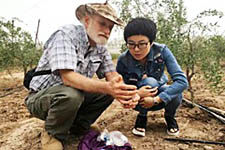 Soil Conservation in Yinchuan, China
Soil Conservation in Yinchuan, China
In 2014 and 2017 Weil visited Ningxia in western China to collaborate with research from Cornell University, the Key Laboratory of Forest Biotechnology and Ningxia University on technologies for soil, water, and biodiversity conservation in this desertified region.
Uganda Oil seed production and soil health
In 2022 Dr. Weil worked in several remote villages in northern Uganda to teach ecological, soil-centric farming to small holder farmers as part of USDAID and Catholic Relief Services farmer - to - Farmer Program.
SoilDoc Development
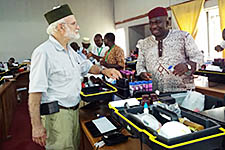 SoilDoc Development and Deployment for African Smallholder Farmers
SoilDoc Development and Deployment for African Smallholder Farmers
Liberia
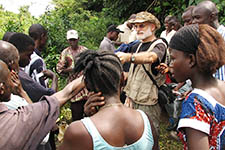 Training the Trainers in Liberia
Training the Trainers in Liberia
Weil worked in several counties of Liberia to assist local NGOs in diagnosing and solving soil fertility problems that plagues smallholder vegetable farmers.
Millennium Villages
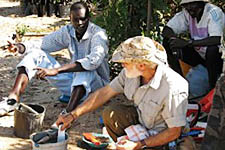 Millennium Villages Project
Millennium Villages Project
From June 2009 to January 2010, Weil served as Senior Research Fellow at Earth Institute Tropical Agriculture Program at Columbia University, New York in which capacity he advised the Millennium Villages Project in on soil and crop related issue in Tanzania, Kenya, Ethiopia, Malawi, Uganda, and Senegal. In each of these countries Weil worked to solve agriculturally related problems in village clusters with up to 30,000 residents. Working directly with villagers as well as with the staff of this integrated development project, Weil performed field diagnosis and problem solving on a wide range of issues including compost production, human waste recycling, fertilizer recommendations, nutrients from indigenous sources, irrigation, soil conservation, cropping systems and rotations, agroforestry, soil testing, soil mapping, materials transport and agronomic crop management.
Mexico
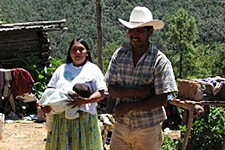 Tarahumara Indigenous Peoples in Mexico
Tarahumara Indigenous Peoples in Mexico
During July 2005 and again in August-September 2009, Weil served as advisor on soil and water issues in rural development for the Tarahumara indigenous peoples in the Sierra Madre Mountains in Mexico. I advised the Government of Chihuahua State, Mexico, Coordinacion por las Tarahumara on compost production and use and on the production of seed for special indigenous “blue” corn that the local communities were producing and processing into premium food products such a pinole, chips and corn meal. Weil also worked closely with field staff of the Laguna Foundation in several isolated Tarahumara communities. This work including problem solving, advising and training on soil conservation, vegetable gardening, irrigation, compost and fertilizer use and other aspects of soil fertility in the Sierra.
Bangladesh
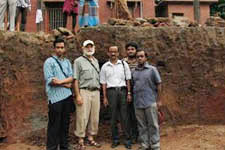 International Symposium on Climate Change and Food Security
International Symposium on Climate Change and Food Security
In August 2008, Weil participated in research planning meetings, presented a lecture at University of Dhaka and served as session chair and a keynote speaker in the International Symposium on Climate Change and Food Security in South Asia, Dhaka, Bangladesh.
Egypt
Black Desert Project
In January 2007, I made a study visit with colleagues from Cairo University to research sites in the Black Desert.
Chad
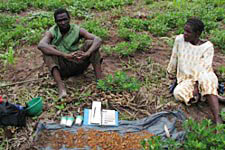 Relationships Between Soil Health and Human Health in Central Africa
Relationships Between Soil Health and Human Health in Central Africa
In January 2006 and July/August 2007, I conducted field research dealing with the relationships between soil health and human health in southern Chad, central Africa. The work was funded by a National Science Foundation grant in collaboration with The School of Public Health at Johns Hopkins University. Recent discovery of oil fields and development of pipelines in Chad had lead to changes in land use and land availability, influencing the pattern of local agricultural rotations with natural fallow. The visit in 2007 was devoted to training Chadian staff and collecting soil quality baseline data in villagers fields.
Ethiopia
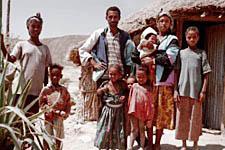 Ethiopian Agriculture Research Organization
Ethiopian Agriculture Research Organization
During July–December, 2001, I served as advisor to the Ethiopian Agriculture Research Organization in the area of Soil and Water Research under a World Bank Agricultural Research and Training Project. In this capacity I worked at both the headquarters and at various research locations around the country to train and assist Ethiopian researchers in advancing agricultural and soil investigations.
Brazil
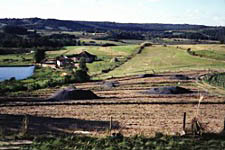 Soil Quality Research in Brazil
Soil Quality Research in Brazil
In July 2000 I collaborated in soil quality research in southern Brazil and presented seminars at the Federal University of Pelotas and the Federal University of Santa Maria.
Honduras
Hands-On Sustainable Development in Honduras
In 1998-2000 I organized and led a soil quality research porject and a January “wintermester” Study Abroad course entitled “Hands-On Sustainable Development in Honduras” in collaboration with El Zamorano University about 50 km from Tegucigalpa, Honduras. Eleven University of Maryland students paired up with El Zamorano counterparts to work on research projects in the field.
Select Publications
Dr. Ray Weil on Google Scholar
Books:
R.R. Weil and N.C. Brady. 2019. Elements of the Nature and Properties of Soils. 4th Edition. Prentice Hall, Upper Saddle River, NJ. 742 p. ISBN-13: 978-0-13-325459-4.
R.R. Weil and N.C. Brady. 2017. The Nature and Properties of Soils. 15 th Ed. Pearson/Prentice Hall, Upper Saddle River, NJ. 1086 p. ISBN-13: 978-0-13-325448-8.
Weil, R.R. 2014. Laboratory Manual for Introductory Soil Science. 9th ed. Kendall/Hunt, Dubuque, IO. 218p ISBN 9781465259226.
Brady, N.C. and R.R. Weil. 2010. Elements of the Nature and Properties of Soils 3rd Edition. Prentice Hall, Upper Saddle River, NJ.
Weil, Ray R. 2009. Lab Manual for Introductory Soil Science. 8th ed. Kendall Hunt, Dubuque, Iowa.
Brady, Nyle and Ray Weil. 2008. The Nature and Properties of Soils. 14th ed. Prentice Hall, Upper Saddle River, NJ. 975 p. ISBN 13-978-0-13-227938-3.
Magdoff, F., and R.R. Weil, (eds.). 2004. Soil Organic Matter in Sustainable Agriculture. CRC Press, Upper Saddle River, NJ.
Brady, N.C. and R.R. Weil. 2002. The Nature and Properties of Soils 13th Ed. Prentice Hall, Upper Saddle River, NJ.
Weil, R.R. and W. Kroontje. 1984. The Nature and Properties of Soils: A Study Guide. MacMillan Pub. Co, New York, NY.
Chapters in Books:
Rahmani, A., and R. Weil. 2018. Rocks, radishes, and restoration: On the relationships between clean water and healthy soil p. 277-286, In A. Toland, et al., eds. Field to palette – the soil art dialogues CRC Press (Taylor and Francis), Boca Raton.
Heckman, J.R., R.R. Weil, and F. Magdoff. 2009. Practical steps to soil fertility for organic agriculture, p. 139-173, In C. A. Francis, ed. Organic farming: The ecological system. American Society of Agronomy/ Crop Science Society of America, and Soil Science Society of America, Madison, WI.
Weil, Ray. 2001. Soil management for sustainable intensification: some guidelines. p. 145-154. In Keeney, D Sustainability of Agricultural Systems in Transition. Agronomy Society of America Special Publication 64, ASA, Madison, WI.
Bottrell, D.G. and R.R. Weil. 1995. Protecting crops and the environment: striving for durability. p. 55-72.
In A.S. Juo Bridging Food Production and Environmental Quality in Developing Countries. ASA Spec. Publ. 60,.
Weil, R.R. and S.K. Mughogho. 1993. Nutrient Cycling By Acacia albida in Agroforestry Systems. p. 97-108. In Ragland Technologies for Sustainable Agriculture in the Tropics. Amer. Soc. of Agronomy Spec. Publ. 56.
Journal Articles:
Sedghi, N., and Weil, R. ( 2022). Fall cover crop nitrogen uptake drives reduced winter-spring leaching. Journal of Environmental Quality 51:in press. 10.1002/jeq2.20342 https://doi.org/10.1002/jeq2.20342
Harou, A. P., Madajewicz, M., Michelson, H., Palm, C. A., Amuri, N., Magomba, C., Semoka, Johnson, S., Tschirhart, K., and Weil, R. (2022). The joint effects of information and financing constraints on technology adoption: Evidence from a field experiment in rural Tanzania. Journal of Development Economics 155:102707. https://doi.org/10.1016/j.jdeveco.2021.102707
Roobroeck, D., C.A. Palm, G. Nziguheba, R. Weil, and B. Vanlauwe. 2021. Assessing and understanding non-responsiveness of maize and soybean to fertilizer applications in African smallholder farms. Agriculture, Ecosystems & Environment 305:107165. http://www.sciencedirect.com/science/article/pii/S0167880920303510
Sarah M. Hirsh, Sjoerd W. Duiker, Jeff Graybill, Kelly Nichols, and Ray R. Weil. 2021. Scavenging and recycling deep soil nitrogen using cover crops on mid-Atlantic, USA farms. Agriculture, Ecosystems & Environment 309:107274. https://doi.org/10.1016/j.agee.2020.107274 http://www.sciencedirect.com/science/article/pii/S0167880920304606
Dana Rushovich and Ray Weil. 2021. Sulfur fertility management to enhance methionine and cysteine in soybeans. Journal of the Science of Food and Agriculture (accepted) https://doi.org/10.1002/jsfa.11307 https://onlinelibrary.wiley.com/doi/abs/10.1002/jsfa.11307
Lucas, Shawn and Ray Weil. 2021. Can Permanganate Oxidizable Carbon Predict Soil Function Responses to Soil Organic Matter Management? Soil Sci. Soc. Amer. Journal. https://doi.org/10.1002/saj2.20282
Hirsh, S.M., and R.R. Weil. 2019. Deep soil cores reveal large end-of-season residual mineral nitrogen pool. Agricultural & Environmental Letters. http://dx.doi.org/10.2134/ael2018.10.0055
Wander, M.M., L.J. Cihacek, M. Coyne, R.A. Drijber, J.M. Grossman, J.L.M. Gutknecht, W.R. Horwath, S. Jagadamma, D.C. Olk, M. Ruark, S.S. Snapp, L.K. Tiemann, R. Weil, and R.F. Turco. 2019. Developments in agricultural soil quality and health: Reflections by the research committee on soil organic matter management. Frontiers in Environmental Science 7. https://www.frontiersin.org/article/10.3389/fenvs.2019.00109
Wang, Fang, Ray R. Weil, Lei Han, Mingxin Zhang, Zhaojun Sun and Xiongxiong Nan. 2019. Subsequent nitrogen utilization and soil water distribution as affected by forage radish cover crop and nitrogen fertilizer in a corn silage production system. Acta Agriculturae Scandinavica, Section B — Soil & Plant Science. DOI: 10.1080/09064710.2018.1498911
Weil, R., and L. Notto. 2018. Sulfur fertilization improves both yield and protein quality of soybean. Enhancing Productivity in a Changing Climate. Baltimore, MD. American Society of Agronomy. https://scisoc.confex.com/scisoc/2018am/videogateway.cgi/id/32799?recordingid=32799
Chen, G., L. Kolb, M. Cavigelli, R. Weil, C. Hooks. 2018. Can conservation tillage reduce N 2 O emissions on cropland transitioning to organic vegetable production? Science of the Total Environment. doi: https://doi.org/10.1016/j.scitotenv.2017.08.296.
Wang, F., and R.R. Weil. 2018. The form and vertical distribution of soil nitrogen as affected by forage radish cover crop and residual side-dressed N fertilizer. Soil Science 183:22-33. doi:
10.1097/SS.0000000000000224
Gilker, R.E. and R.R. Weil. 2017. Inorganic nitrogen losses to groundwater are minimal from two management-intensive grazing dairy farms in Maryland. Renewable Agriculture and Food Systems: 1-13. doi:10.1017/S1742170517000114.
Wang, F., R.R. Weil and X. Nan. 2017. Total and permanganate-oxidizable organic carbon in the corn rooting zone of US Coastal Plain soils as affected by forage radish cover crops and N fertilizer. Soil and Tillage Research 165: 247-257. doi: http://dx.doi.org/10.1016/j.still.2016.08.022.
Tully, K., C. Sullivan, R. Weil and P. Sanchez. 2015. The State of Soil Degradation in Sub-Saharan Africa: Baselines, Trajectories, and Solutions. Sustainability 7: 6523-6552.
Poffenbarger, H.J., S.B. Mirsky, R.R. Weil, J.E. Maul, M. Kramer, J.T. Spargo, et al. 2015. Biomass and Nitrogen Content of Hairy Vetch–Cereal Rye Cover Crop Mixtures as Influenced by Species Proportions. Agronomy Journal 107: 2069-2082. doi:10.2134/agronj14.0462.
Poffenbarger, H.J., S.B. Mirsky, R.R. Weil, M. Kramer, J.T. Spargo and M.A. Cavigelli. 2015. Legume Proportion, Poultry Litter, and Tillage Effects on Cover Crop Decomposition. Agronomy Journal 107: 2083-2096. doi:10.2134/agronj15.0065.
Poffenbarger, H.J., S.B. Mirsky, M. Kramer, R.R. Weil, J.J. Meisinger, M.A. Cavigelli, et al. 2015. Cover Crop and Poultry Litter Management Influence Spatiotemporal Availability of Topsoil Nitrogen. Soil Science Society of America Journal. doi:10.2136/sssaj2015.03.0134.
Lounsbury, N.P., and R.R. Weil. 2015. No-till seeded spinach after winterkilled cover crops in an organic production system. Renewable Agriculture and Food Systems 30:473-485. http://dx.doi.org/10.1017/S1742170514000301
Belle, A.J., S. Lansing, W. Mulbry, and R.R. Weil. 2014. Anaerobic co-digestion of forage radish and dairy manure in complete mix digesters. Bioresource Technology. 10.1016/j.biortech.2014.09.036
Wang, F., Y.A. Tong, P. Gao, J. Zhang, R.R. Weil, and J.N. Coffie. 2014. Organic amendments to a wheat crop alter soil aggregation and labile carbon on the loess plateau, China. Soil Science 179:166-173.
Tulley, K. R.R. Weil, C. Palm. 2014. Ion selective electrode offers accurate, inexpensive method for analyzing soil solution nitrate in remote regions. Communications in Soil Science and Plant Analysis. 45: 1974-1980.
Chen, G., R.R. Weil and R. Hill. 2014. Effects of Compaction and Cover Crops on Soil Least Limiting Water Range and Air Permeability. Soil & Tillage Research 136:61-69.
Geatz, G.W., B.A. Needelman, R.R. Weil, and J.P. Megonigal. 2013. Nutrient availability and soil organic matter decomposition response to prescribed burns in mid-Atlantic brackish tidal marshes. Soil Sci. Soc. Am. J. 77:1852–1864.
Lucas, S.T., and R.R. Weil. 2012. Can a labile carbon test be used to predict crop responses to improve soil organic matter management? Agronomy J. 104:1160-1170.
Lawley, Y.E., J.R. Teasdale, and R.R. Weil. 2012. The mechanism for weed suppression by a forage radish cover crop. Agronomy J. 104:205-214.
Gruver, J., R.R. Weil, C. White, and Y. Lawley.2012.Radishes – a new cover crop for organic farming systems. e-Organic e-Extension, https://eorganic.org/node/4182
Bickford, W., B. Needelman, R. Weil, and A. Baldwin. 2012. Vegetation response to prescribed fire in mid-atlantic brackish marshes. Estuaries and Coasts 35:1432-1442.
Chen, G., and R.R. Weil. 2011. Root growth and yield of maize as affected by soil compaction and cover crops. Soil and Tillage Research 117:17-27.
Lawley, Y., R.R. Weil, and J. Teasdale. 2011. Forage radish winter cover crops suppress winter annual weeds in fall and before corn planting. Agronomy J. 103:137-144.
White, C.M. and R. R. Weil. 2011. Forage radish cover crops increase soil test Phosphorus surrounding holes created by radish taproots. Soil Sci. Society of America Journal. 75:121-130.
Chen, G., and R.R. Weil. 2010. Penetration of cover crop roots through compacted soils. Plant and Soil 10.1007/s11104-009-0223-7.
Gruver, L.S., R.R. Weil, I.A. Zasada, S. Sardanelli, and B. Momen. 2010. Brassicaceous and rye cover crops altered free-living soil nematode community composition. Applied Soil Ecology (in press) (doi:10.1016/j.apsoil.2009.11.007)
Dean, J.E., and R.R. Weil. 2009. Brassica cover crops for N retention in the Mid-Atlantic coastal plain. J Environ Qual 38:520-528.
White, C.M. and R. R. Weil. 2009. Forage radish and cereal rye cover crop effects on mycorrhizal fungus colonization of corn roots. Plant and Soil 328:507-521.
Wills, S., B. Needelman and R. Weil. 2008. Carbon distribution in restored and reference marshes at Blackwater National Wildlife Refuge. Archives of Agronomy and Soil Science 54:239 – 248.
Gruver, Joel and Ray Weil. 2007. Farmer perceptions of soil quality and their relationship to management- sensitive soil parameters. Renewable Agriculture and Food Systems 22: 271-281.
Weil, R., and A. Kremen. Thinking across and Beyond Discipines to Make Cover Crops Pay. Journal of the Science of Food and Agriculture 87:551-557.
Waddell, J.T. and R.R. Weil. 2006. Effects of Fertilizer Placement on Solute Leaching under Ridge Tillage and No Till. Soil & Tillage Research. 90:194-204.
Wienhold, B.J., and R.R. Weil. 2006. Preserving Soil and Crop Resources by Increasing Cropping Intensity and Decreasing Tillage. Renewable Agriculture and Food Systems. 21:1-2.
Williams, S.M., and R.R. Weil. 2004. Crop Cover Root Channels May Alleviate Soil Compaction Effects on Soybean Crop. Soil Sci Soc Am J 68:1403-1409.
Gilker, R.E., R.R. Weil, and B. Mertz, (eds.). 2004. Making the Switch: Two Successful Dairy Graziers Tell Their Stories. Future Harvest - Chesapeake Alliance for Sustainable Agriculture:1-16.
Weil, R.R., K.R. Islam, M.A. Stine, J.B. Gruver, and S.E. Samson- Liebig. 2003. Estimating Active Carbon for Soil Quality Assessment: A Simplified Method for Lab and Field Use. Amer. J. of Alternative Agric. 18:3-17.
Weil, R.R., and R.E. Gilker. 2003. Management intensive grazing: Environmental impacts and economic benefits. Fact Sheet. University of Maryland, College Park, MD.:.
Weil, R.R., and S.A. Williams. 2003. Brassica cover crops to alleviate soil compaction. Fact Sheet. University of Maryland, College Park, MD.:.
Weil, Ray R. 2003. Getting To Know a Catena: A Field Exercise for Introductory Soil Science. J. Nat. Resour. Life Sci. Educ. 32 :1-4.
Weil, Ray R. 2002. Soil and Environmental Quality: A Course for Non-Majors. J. Nat. Resour. Life Sci. Educ. 31:117-122.
Stine, M. A. and Weil, R. R. 2002. The relationship between soil quality and crop productivity across three tillage systems in south central Honduras. Amer. J. Alternative Agric. 17:2-8.
Gilker R.E., Weil R.R., Krizek D.T. and Momen B. 2002. Eastern Gamagrass Root Penetration in Adverse Subsoil Conditions. Soil Science Society of America Journal 66:631-638.
Weil, Ray. 2000. Soil and Plant Influences on Crop Response to Two African Phosphate Rocks. Agronomy Journal 92:1167-1175.
Islam, K.R. and R.R. Weil. 2000. Soil quality indicator properties in the mid-Atlantic region as influenced by conservation management. Jour. Soil and Water Conserv. 55:69-78.
Islam, K.R. and R.R. Weil. 2000. Land use effect on soil quality in tropical forest ecosystem of Bangladesh. Agric., Ecosystems, and Environ. 79:9-16.
Weil, Ray R. and Spider K. Mughogho. 2000. Sulfur nutrition of maize in four regions of Malawi. Agronomy Journal 92:649-656.
Islam, K.R. and R.R. Weil. 1998. Microwave irradiation of soil for routine measurement of microbial biomass. Biology and Fertility of Soils 27:408-416.
Islam, K.R. and R.R. Weil. 1998. A rapid microwave digestion for colorimetric measurement of soil organic carbon. Commun. Soil Sci. and Plant Anal. 29:2269-2284.
Cartron, J. and R. Weil. 1998. Seasonal trends in soil nitrogen from injected or surface-incorporated sewage sludge applied to corn. Commun. Soil Sci. and Plant Anal. 29:121-139.
Weil, R.R., K.A. Lowell, and H.M. Shade. 1993. Effects of intensity of agronomic practices on a soil ecosystem. Amer J. Altern. Agric. 8:5-14.
Craig, J.P., and R.R. Weil. 1993. Nitrate leaching to a shallow mid-Atlantic coastal plain aquifer as influenced by conventional no-till and low-input sustainable grain production systems. Water Science & Technology 28:691-700.
Weil, R.R. and M.E. McFadden. 1991. Fertility and weed stress effects on performance of maize/soybean intercrop. Agron J. 83:717-721.
Weil, R. R. 1990. Defining and using the concept of sustainable agriculture. J. Agron. Educ. 19:126-130.
Weil, R.R., R.A. Weismiller, and R.S. Turner. 1990. Nitrate contamination of groundwater under irrigated coastal plain soils. J. Environ. Qual. 19:441-448.
Weil, R.R. 1982. Maize-weed competition and soil erosion in unweeded maize. Tropical Agriculture 59:207-213.
Weil, R.R. and W. Kroontje. 1977. Grade inflation: causes and cures. J. Agron. Educ. 6:29-34.
Weil, R.R., and W. Kroontje. 1976. Improving the quality of computer-scored tests in agronomic courses. J. Agron. Education. 5:78-86.